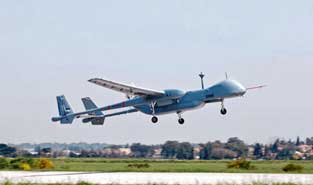
For one thing, it had never quite got over the blow to its self-confidence when the Lavi, an advanced dual-role combat aircraft, was cancelled by the government headed by Mr Shamir senior in 1987. Although the Lavi was on course to meet all its performance targets, the cost of the project and American concern that it was helping to finance a rival to its F-16 and F-18 fighters killed it. For IAI, it meant that it would never again try to make a fast jet on its own.
For another, despite recovering much of its technological élan, IAI was an organisational and financial mess. Executives say it had gone three years without a formal chairman and two years without a signed financial statement. Banks had seized some of its financial assets and its chief executive of 20 years, Moshe Keret, was facing bribery allegations (he denied these and the case was dropped for lack of evidence). The firm was also in the grip of the Histadrut union federation, which fought all attempts to slim a bloated workforce and introduce merit-based remuneration.
When Mr Shamir arrived on the scene he was fresh from helping guide the national flag carrier, El Al, towards privatisation and he was willing to take on the job only if he had the same freedom to lead IAI in a similar direction. Fortunately, although much needed to be done to create what Mr Shamir calls a culture of transparency and accountability, the basis of a powerful business was there. Part of IAI’s purpose has always been to provide the Israel Defence Forces (IDF) with the means to maintain the country’s security against its many enemies. But to achieve reasonable scale despite a relatively small national defence budget, and to compete with rivals many times its size, IAI has been obliged to chase foreign sales. Today, says Mr Shamir, around 80% of IAI’s revenues are earned abroad, with Asia the firm’s fastest-growing and biggest market.
The company’s close links with the IDF help in several ways. “As used by the IDF” is a big selling-point, says Mr Shamir. The IDF’s experience of fighting frequent wars has meant that IAI has a demanding primary customer that is always trying to keep several moves ahead of its potential foes. For example, since the mistakes made both before and during the Yom Kippur war of 1973 the IDF has put a premium on real-time intelligence to give it “situational awareness”. After the cancellation of the Lavi, IAI concentrated more on developing unmanned aerial vehicles (UAVs, also called drones) and satellites to provide first the IDF and then overseas customers with state-of-the-art capability in intelligence, surveillance and reconnaissance.
IAI now offers a range of observational and communications satellites that combine the same performance as rival systems with very light weight, which makes them both cheaper to launch and more agile in orbit. Its fleet of UAVs extends from tiny electric-powered “kites” that let infantry peer over the next hill, to the Eitan (pictured), a pilotless aircraft with the wingspan of a Boeing 737 that can stay aloft for 35 hours at more than 40,000 feet and is said to be capable of reaching Iran. The Eitan is able to perform a mix of missions from surveillance to jamming enemy communications and is clearly more than big enough to carry ground-attack missiles. A smaller version of the Eitan, the Heron, is in service with nine air forces and is being used extensively in Afghanistan. IAI has also developed a manned airborne early-warning system based on a Gulfstream G550 executive jet.
Another area where IAI is uniquely strong because of Israel’s security requirements is in anti-ballistic-missile defences. Its Arrow 2 interceptor missile (developed with Boeing) will soon be joined by the Arrow 3 to form part of a four-tier territorial and theatre defence against every kind of rocket attack. No other country has yet bought the Arrow, although India and Turkey have both expressed interest.
As well as its thriving defence activities, IAI also manufactures a mid-size business jet for Gulfstream and carries out cargo conversions of commercial airliners, a business that suffered during the downturn but which is now picking up. Group sales in 2010 should exceed $3 billion and Mr Shamir reckons that in two years’ time they will be more than $4 billion. Net profit for the first nine months of 2010 was $80m compared with $53m in the same period a year before. In 2009 IAI paid a dividend to the Israeli government of $90m.
Quite when privatisation will come remains uncertain (there is still some resistance within the defence ministry as well as from the union), but for Mr Shamir it cannot happen soon enough. Privatisation will give IAI currency and flexibility for acquisitions and allow it more discretion over how it spends its R&D cash. Mr Shamir’s vision is to float 30% of the company in an initial public offering and to give 10% in stock options to employees. Over five years he expects the government’s share to fall to 49%. He would like to see IAI dual-listed on an international stock exchange, such as NASDAQ, as well as the local TASE. Given its strategic importance to Israel, IAI may never be quite a normal company. Mr Shamir, however, would happily settle for normal enough.


Artículos Relacionados: